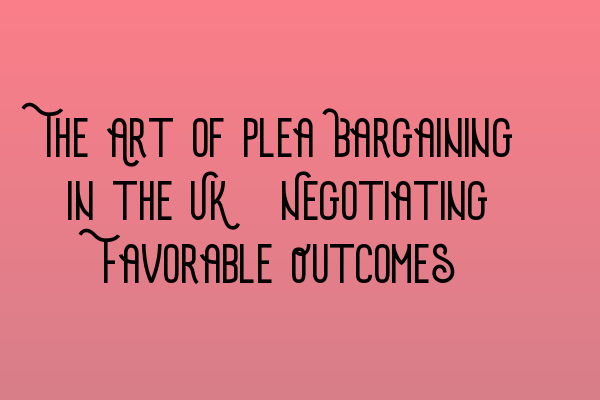The Art of Plea Bargaining in the UK: Negotiating Favorable Outcomes
When it comes to criminal law cases in the UK, negotiation plays a crucial role in achieving favorable outcomes for defendants. One of the most valuable tools in negotiations is the practice of plea bargaining. Plea bargaining allows defendants and their solicitors to reach agreements with the prosecution, thereby avoiding trials and potentially reducing the severity of the charges or the penalties imposed.
What is Plea Bargaining?
Plea bargaining is a negotiation process between the defendant’s solicitor and the prosecution, where both parties attempt to reach a mutually beneficial agreement. Throughout this process, various factors, such as the strength of evidence, the seriousness of the charges, the defendant’s criminal history, and the potential consequences of going to trial, are taken into consideration.
By engaging in plea bargaining, defendants have the opportunity to avoid the risks associated with a trial, such as longer sentences if found guilty, high legal costs, and the emotional toll of going through a prolonged legal process. Additionally, plea bargaining can also help alleviate the burden on the courts by reducing the number of cases that go to trial.
Types of Plea Bargaining
There are several types of plea bargaining that can be utilized in criminal law cases in the UK, including charge bargaining, sentence bargaining, and fact bargaining.
Charge bargaining involves the negotiation of reducing or dismissing some of the charges against the defendant in exchange for a guilty plea to a lesser charge. This can result in a more lenient sentence or a reduction in the potential consequences a defendant may face.
Sentence bargaining focuses on negotiating a specific sentence or penalty that is more favorable to the defendant. This can involve pleading guilty in exchange for a reduced sentence or for the agreement that certain sentencing options will not be pursued.
Fact bargaining involves negotiating the admission or exclusion of certain facts or evidence from the case. This can be advantageous to the defendant if the exclusion of certain evidence weakens the prosecution’s case or highlights potential inconsistencies in the evidence presented.
Benefits of Plea Bargaining
The art of plea bargaining offers several benefits to defendants, including:
- Reduced Charges: By negotiating a guilty plea to a lesser charge, defendants can avoid more severe penalties and consequences.
- Reduced Sentences: Plea bargaining often leads to reduced sentences, allowing defendants to spend less time in prison or to avoid incarceration altogether.
- Avoidance of Trial: Trials can be lengthy, costly, and emotionally draining. Plea bargaining allows defendants to resolve their cases without going through the trial process.
- Lower Legal Costs: Trials can be expensive, with legal fees quickly accumulating. Plea bargaining can help save defendants money by avoiding the need for a full trial.
- Opportunity for Rehabilitation: By accepting responsibility for their actions through a guilty plea, defendants may show their willingness to change and engage in rehabilitation programs. This can positively impact their prospects for future employment and overall life after the case is resolved.
Keyword Integration
In the context of UK criminal law cases, plea bargaining plays a crucial role in achieving favorable outcomes. The practice of plea bargaining allows defendants and their solicitors to negotiate agreements with the prosecution, leading to reduced charges, sentences, and the avoidance of trials. To better understand the process of plea bargaining and its benefits, it is important to have a comprehensive understanding of the UK legal system. For more information on legal qualifications in the UK, read the article on Demystifying the Solicitors Qualifying Examination Format. For entrepreneurs in the UK looking to set up a business, our step-by-step guide on LLC Formation Made Simple: Step-by-Step Guide for UK Entrepreneurs provides valuable information. If you’re interested in understanding the legal aspects of business regulations in the UK, make sure to check out our comprehensive overview on Business Regulations in the UK: A Comprehensive Overview. Lastly, for a deeper insight into corporate structures, our article on Decoding Corporate Structures: A Comprehensive Legal Insight may be of interest.
In conclusion, plea bargaining is a valuable strategy that defendants and their solicitors can employ to negotiate favorable outcomes in criminal law cases in the UK. By understanding the different types of plea bargaining and the benefits they offer, defendants can make informed decisions about their legal representation. The integration of plea bargaining in the UK legal system provides an opportunity for defendants to obtain favorable resolutions while considering the best interests of justice.
